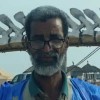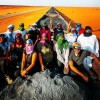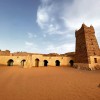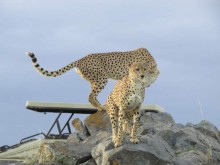Private guides and guided tours in Mauritania
Private guides in Mauritania
Travel Agency in Nouakchott - Bouh
(Member Since 2023) Languages: English, French, ArabicBouh Tour guide in Mauritania north africa and The owner of Tour in Mauritania travel agency is a renowned tour company committed to sharing incredible Mauritanian landscapes, genuine nomad culture, and...
Private Guide in Nouakchott - Chinguitty
(Member Since 2009) Excursions/tous in the following cities: Nouakchott Languages: English, French, Italian, ArabicCHINGUITTY VOYAGES is an International Tour Operator specializing in tourism in West Africa. Our headquarters are located in Nouakchott, Mauritania. However, additional correspondent offices are located throughout West Africa in Senegal, Mali, and Gambia.
Private Guide in Atar - Sidi
(Member Since 2025) Languages: French, English, ArabicMy name is Sid’ahmed , and I’ve been a professional tour guide in Mauritania for over fifteen years. I specialize in organizing authentic and immersive tours across the entire country, with a...

Mauritania
Language: Arabic
Currency: Ouguiya (MRO)
Calling Code: +222
CAPITAL CITY OF Mauritania: Nouakchott
LANGUAGE OF Mauritania: Arabic
CURRENCY OF Mauritania: Ouguiya (MRO)
COMMENTS ABOUT Mauritania:
Mauritania, officially the Islamic Republic of Mauritania, is a country in northwest Africa
Cities : Nouakchott (capital), Atar, Kifa, Aleg, Nouadhibou, Kaedi, Selibaby, Nema, Ayoun el Atrous, Akjoujt, Tidjikdja, F'derik, Rosso
Visas / Passport : All visitors to Mauritania require a passport. French, Italian and West African passport holders do not require a visa to enter. All other countries require a visa, as well as proof of yellow fever vaccination. Visitors must also have proof of onward travel and sufficent funds.
Eat : fish, chebogen, Mechui, grilled sheep, carcasses
Electricity : 220V/50Hz (European plug)
Calling Code : +222
Time Zone : UTC
Independent from France in 1960, Mauritania annexed the southern third of the former Spanish Sahara (now Western Sahara) in 1976, but relinquished it after three years of raids by the Polisario guerrilla front seeking independence for the territory. Opposition parties were legalized and a new constitution approved in 1991. Two multiparty presidential elections since then were widely seen as flawed, but October 2001 legislative and municipal elections were generally free and open. Mauritania remains, in reality, a one-party state. The country continues to experience ethnic tensions between its black population and the dominant Moor (Arab-Berber) populace.
CLIMATE OF Mauritania: desert; constantly hot, dry, dusty
RELIGION OF Mauritania: Muslim 100%
POPULATION OF Mauritania: 2,998,563 (July 2004 est.)>>
ECONOMY OVERVIEW OF Mauritania: Half the population still depends on agriculture and livestock for a livelihood, even though many of the nomads and subsistence farmers were forced into the cities by recurrent droughts in the 1970s and 1980s. Mauritania has extensive deposits of iron ore, which account for nearly 40% of total exports. The decline in world demand for this ore, however, has led to cutbacks in production. The nation's coastal waters are among the richest fishing areas in the world, but overexploitation by foreigners threatens this key source of revenue. The country's first deepwater port opened near Nouakchott in 1986. In the past, drought and economic mismanagement resulted in a buildup of foreign debt. In February 2000, Mauritania qualified for debt relief under the Heavily Indebted Poor Countries (HIPC) initiative and in December 2001 received strong support from donor and lending countries at a triennial Consultative Group review. In 2001, exploratory oil wells in tracts 80 km offshore indicated potential extraction at current world oil prices. A new investment code approved in December 2001 improved the opportunities for direct foreign investment. Ongoing negotiations with the IMF involve problems of economic reforms and fiscal discipline. Substantial oil production and exports probably will not begin until 2005. Meantime the government emphasizes reduction of poverty, improvement of health and education, and promoting privatization of the economy.



 French
French Spanish
Spanish Russian
Russian





















